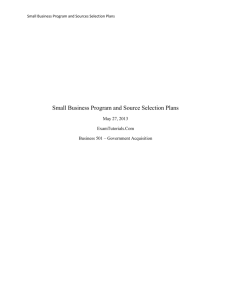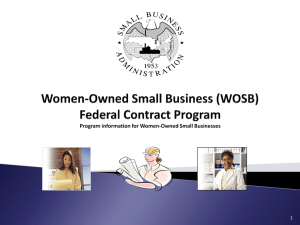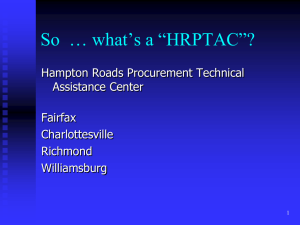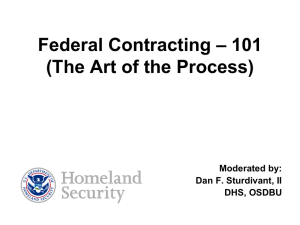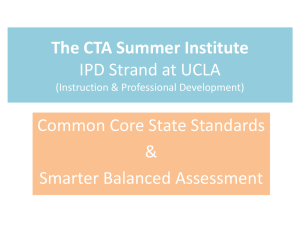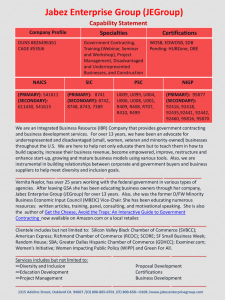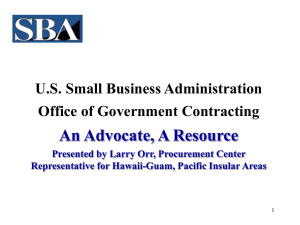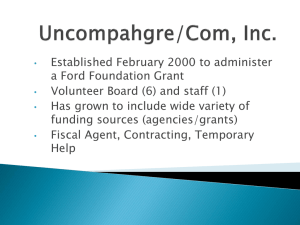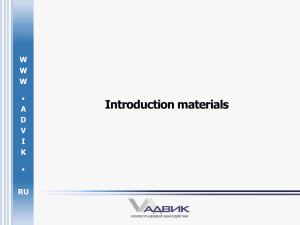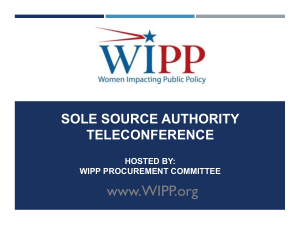SBA 2011 Regulatory Update for Jobs Act and WOSB Program as of
advertisement
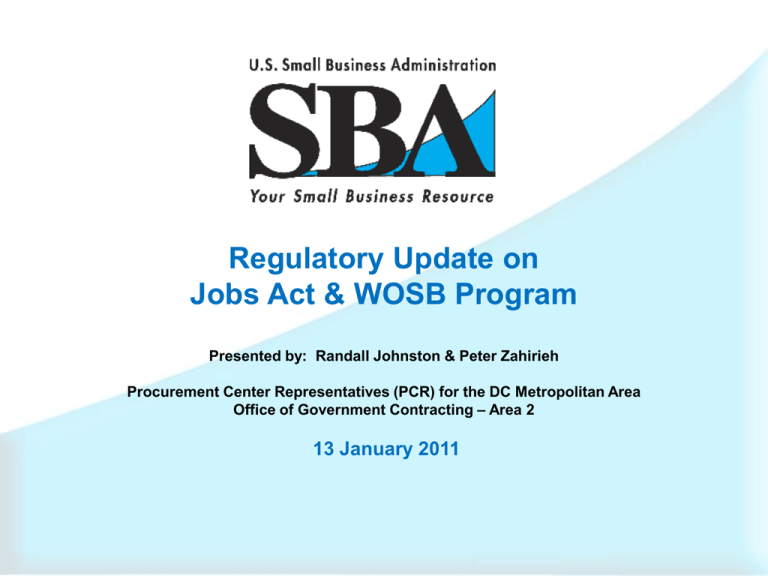
Regulatory Update on Jobs Act & WOSB Program Presented by: Randall Johnston & Peter Zahirieh Procurement Center Representatives (PCR) for the DC Metropolitan Area Office of Government Contracting – Area 2 13 January 2011 Small Business Jobs Act of 2010 On September 27, 2010, President Obama signed Small Business Jobs Act of 2010 (Public Law 111-240; Sections 1312 thru 1347) Small Business Jobs Act- Contd. The Act is intended to benefit small businesses by providing them with tax breaks, and better access to capital. The Act also contains a number of provisions that will help small business contractor who are pursuing prime and/or and subcontracting opportunities with the federal government or currently performing on government contracts or subcontracts. This equates to 19 actions. 1. Parity Section 1347 – Amends SBA Act by deleting “shall” in FAR Part 19.1305(a) and replacing with “may” for contract actions that have a reasonable expectation that two or more HUBZone small business concerns will submit offers (“the rule of two”). 1. Parity Cont’d FAR 19.1305 is affected and the change in the language re-establishing the equivalence between HUBZone small businesses and other set-aside programs to include 8(a), SDVOSB, and WOSB set-asides. 2. Repeals the Comp Demo Program FAR Part 19.10 is deleted in its entirety. Originally, Congress established the Small Business Com-Demo Program in 1988 to test the effectiveness of eliminating small business set-asides in certain industries. The Act eliminates unrestricted competition in designated industry groups ( FAR Part 19.1005) and the enhanced small business participation in 10 agency targeted industry groups. 3. Set Asides for Multiple Award Schedules 15 U.S.C. 644 under Section 15 as amended requires that FAR be changed to establish guidance under which agencies “may, at their discretion” (i) set aside part or parts of a multiple award contract for small business; (ii) set aside orders placed against multiple award contracts for small businesses; and (iii) reserve one or more contract award(s) for small businesses under full and open competition multiple award procurements. 4. Presumption of Loss for Misrepresentation by a firm Government may recoup the costs for the total amount expended when a concern that is other than small willfully sought and received a contract intended for small business. Misrepresentation includes: Submission of a proposal or bid intended for or encouraging to be classified as a small business set-aside. CCR or ORCA registration 5. Requires Annual Certifications of Status Current Regs - In contracts lasting up to 5 years, the bidder or offeror certifies it’s size at the time of submission of proposal or bid. In long term contracts, the contractor is required to certify its size on the 5th year of the performance period and every option year, thereafter. The Act requires certifications of Size Status to be performed annually using the Online Reps & Certs Application (ORCA) database . 6. Section 1343 - Establish Government- Wide Policy for Prosecution of Size and Status Fraud No later than 1 year after the date of enactment, the SBA Administrator in consultation with the DOJ Attorney General will issue the policy for prosecution of size and status fraud. 7. Section 1314 - Establishes SB Teams Pilot Program Issue grants for up to $5 million to organizations that will consult with small business concerns and help establish teaming and joint ventures seeking to compete for larger prime contracts and subcontracting opportunities. 7. Establish SB Teams Pilot Program Cont’d The eligible organizations for an award of a grant will recommend contracting opportunities for teaming arrangements and joint ventures for small business concerns. Program expires in 5 years 8. Section 1347 – Establishment of Mentor Protégé Programs in HUBZone, SDVOSB, and WOSB The Administrator may expand and establish official programs for small business set-aside programs in HubZone, SDVOSB, and WOSB modeled on the SBA’s existing 8(a) Mentor Protégé Program. 9. Section 1321 - Subcontracting Misrepresentations Requires that, by September 27, 2011, the FAR be amended to establish a policy on subcontracting compliance relating to small businesses, including assignment of compliance responsibilities between contracting offices, small business offices, and program offices and periodic oversight and review activities. 10. Section 1322 - Holding Large Prime Contractors Accountable to Their Subcontracting Plans To the extent the prime contractor is unable to make a good faith effort to utilize its small business subcontractors, the contractor must explain in writing to the Contracting Officer reasons why it is unable to do so. 11. Section 1334 – Payment to subcontractors Prime contractor shall notify the Contracting Officer in writing if: Subcontractor payments are less than the agreed to price Timeliness of payments – cannot pay within 90 days Contracting Officer is to consider unjustified payment as a factor in rating performance Section 1313 – Limitation on the Use of Acquisitions Involving Consolidation 12. The act provides that before agency bundles contract requirements with a total value of more than $2 million: Conduct Market Research and Identify alternative contract approach involving less consolidation Make written determine if consolidation is necessary Certify steps will be taken to include small business concerns in the acquisition plan/strategy 13. Section 1312 - Bundling Accountability Measures & Oversight Teaming requirements – Agencies are to solicit MAS proposals (above substantial bundling threshold) from any responsible source, including small business concerns and teams or joint ventures of small business concerns. By September 27, 2011, amend the FAR to establish government-wide policy on contract bundling. Reduction of contract bundling through publication agencies required to post a list of rationale of any bundled contracts the agency has solicited or awarded. 14. ePCR – 3 Year Pilot Program Within 1 year of enactment, implement a 3year pilot program for the PCR. This will allow the PCR to cover more contracting activities and procurement reviews. 15. Update Size Standards Cycle Act provides every 18 months, the SBA must conduct a rolling review of at least 1/3 of the existing size standards, and the SBA must conduct a complete review of all size standards at least every 5 years. These reviews allow proper adjustment of industry sectors for more participation in small business setasides. 16. Establishes an Official HUBZone Subcontracting Goal Amends the calculation of the government-wide procurement goal of 3% participation by HUBZone small businesses to cover subcontracts (the previous goal of “3 percent of the total value of all prime contracts” now reads “3 percent of the total value of all prime contracts and subcontracts”). 17. Micro-Purchase Guidelines No later than 1 year after enactment, OMB & GSA Administrator to create guidelines for analysis of purchase card expenditures to identify opportunities for achieving and accurately measuring fair participation of small businesses in purchases not exceeding micro-purchase thresholds. This effort will help measure SB Participation in ways to increase small business goals. 18. Section 1333 - Agency Accountability Agency goal communications at all levels - Senior Procurement Executives, senior Program Managers, and OSDBU Directors shall communicate to the subordinates the importance of achieving small business goals. 19. SB Contracting Training FAI in consultation with OFPP, DAU and the SBA shall develop courses for acquisition personnel (1102s, requirements personnel, and management) concerning proper classification of business concersns and small business size and status for purposes of Federal contract vehicles. Point of Contacts for Jobs Act Website at: http://www.sba.gov/content/smallbusiness-jobs-act-2010 Dean Koppel: Assistant Administrator for SBA Government Contracting Policy Dean.koppel@sba.gov or (202) 205-7322 WOMEN OWNED SMALL BUSINESS (WOSB) CONTRACTING PROGRAM WOSB Contracting Program Final Rule Effective Date: February 4, 2011 FAR Implementation IAE Changes Background and Regulatory History SB Authorization Act of 2000 authorized Federal contracting officers to restrict competition to eligible WOSBs. SBA issued final rule on October 7, 2010 The effective Date is February 4, 2011 WOSB Final Rule The firm must be 51 percent owned and controlled by one or more women, and primarily managed by one or more women. The firm must be “small” in its primary industry in accordance with SBA’s size standards for that industry Woman/Women must be U.S. Citizens WOSB Contracting Program Final Rule Establishes 83 Industries 4-digit NAICS Codes (373 6-Digit NAICS Codes) 216 Underrepresented 157 Substantially Underrepresented 373 6 digit NAICS codes List at www.sba.gov/wosb WOSB Contracting Program CERTIFICATIONS The Final Rule allows WOSBs or EDWOSBs to self-certify their status or to be certified by thirdparty certifiers, including government entities and private certification groups. WOSB Contracting Program Contracting Officer’s Responsibilities Reasonable Expectation of 2 or More Offers by WOSBs Anticipated Award Price must not exceed: $5M – Manufacturing $3M – All other (OMB reviewing an increase for inflation) WOSB Contracting Program More to Come at www.sba.gov/wosb Link to the Repository Instructions for accessing the Repository Contracting Officer’s Guide WOSB Contracting Program The following website provides: http://www.sba.gov/content/contractingopportunities-women-owned-smallbusinesses The Final Rule & History FAQs Fact Sheet NAICS codes for the program Compliance Guide for Small Entities Lists required documents for the repository Contact Information 1-800-U-ASK-SBA (1-800-827-5722) Thank You QUESTIONS?
